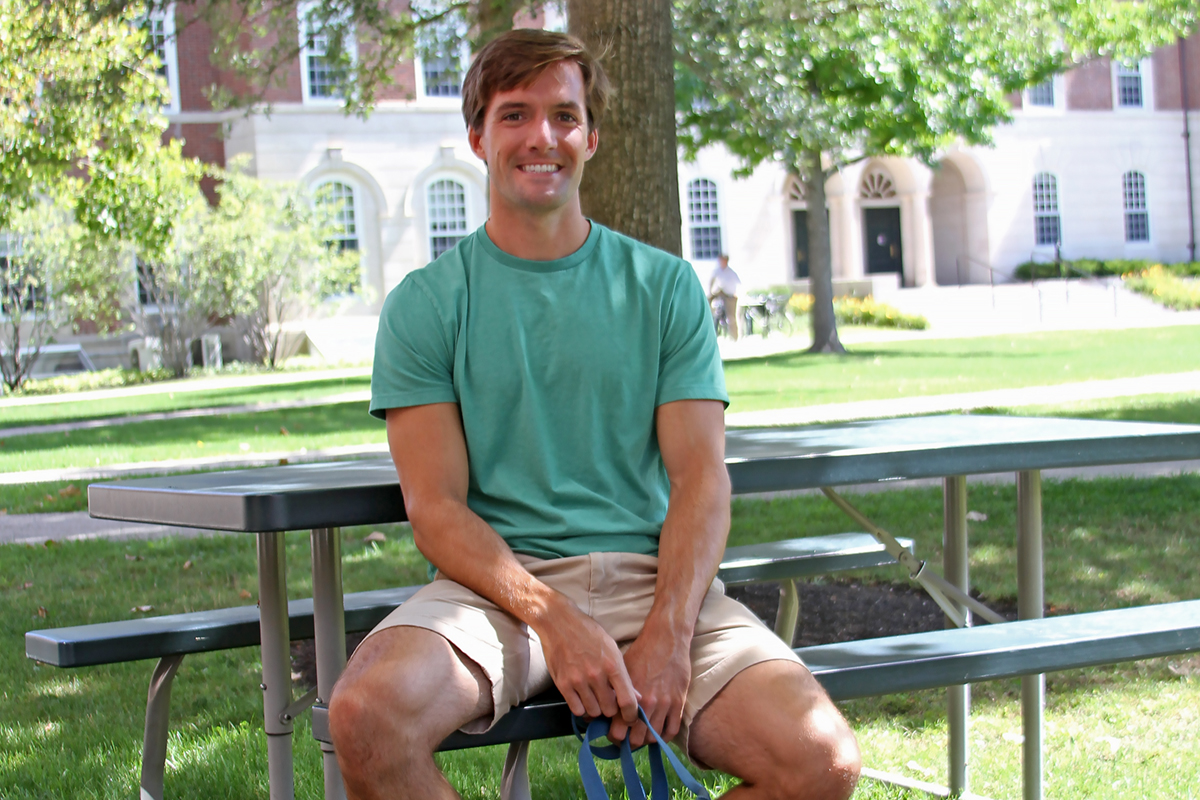Tyler Caldwell

The bulletin boards in English Instructor Tyler Caldwell’s Phillips Hall classroom are peppered with New Yorker magazine covers. Given his Renaissance man tendencies, this seems fitting. In the course of a conversation, one is as likely to hear about themes of re-birth in Moby-Dick and Caldwell’s passion for student writing as about hip-hop and his utter devotion to his Border collie Kip, named for a character in The English Patient.
In many ways, Caldwell was destined to teach. He, twin sister Alexa — an instructor in Exeter’s History Department — and a younger sister grew up in Middletown, Delaware, on the campus of St. Andrew’s School, where their mother taught English and their father served as assistant head of school. Within a close-knit and athletic family, Caldwell and his siblings were encouraged to experiment with myriad activities. For him, this meant learning the bassoon and alto saxophone, swimming and rowing, and playing soccer.
That trend continued at Harvard, where Caldwell majored in English and minored in Chinese; rowed all four years as a member of the varsity men’s lightweight crew team; and channeled his love of hip-hop dance into volunteer work with City Step, a program run entirely by Harvard undergraduates that introduces public middle schoolers to dance and theater as a means of building creative self-expression and self-esteem. All the while, thanks to the example of his parents, independent school teaching remained Caldwell’s career goal.
As one might expect, he quickly immersed himself in the cadence of Academy life when he arrived in the fall of 2011 as an intern in the English Department. Now in his sixth year of teaching, Caldwell has served as head boys crew coach, coordinator of prep courses for the English Department and dorm head for Soule Hall. He is spending his summers working on a master’s degree at Middlebury College.
Caldwell, who turns 28 at the end of May, is enjoying feeling more rooted in Exeter and is clearly passionate about his work. His exuberance is most evident when he talks about his students’ writing. “Exeter’s writing program is unlike any I experienced before I arrived,” he muses, “and that is because we focus so heavily on writing from personal experience. I think our students find strength from writing about their own lives and what they know, and reading their writing gives depth to the voices around the Harkness table. I feel privileged to be able to see what they value and how they talk about their lives up to this point.”
For Caldwell, Harkness is like the Pequod
The other subject that animates Caldwell is whales. In particular, the albino sperm whale from Herman Melville’s masterpiece, Moby-Dick, to which he dedicated an entire chapter in his senior thesis at Harvard. Caldwell has loved teaching Exeter’s long-running and popular Moby-Dick elective, steering his seniors through a novel he finds both brilliant and timeless: “There is so much to it as a text, and it was so experimental for its time; I think that encourages our seniors to be experimental in their analysis of it. In many ways, it embodies the work that is happening at the Harkness table. In the first few chapters, we study the narrator Ishmael, and the students catch on to his ability to revise his initial judgments. That kind of flexibility, they seem to gravitate toward it, and it frees them up.”
Caldwell sees more elements “of life imitating art” in the chapter where Queequeg pulls his shipmate Tashtego from a sperm whale’s head. “It is a scene of rebirth that reminds me so much of what happens around the Harkness table. Just when one student feels like he is floundering or lost, another student dives in to help him navigate the text and bring his idea to life.”
—Melanie Nelson
More to Explore
Course
AUTHOR IMMERSION: Herman Melville
The senior reading seminars immerse students in the sustained study of an author, which students will choose from a list representing a range of diverse voices, periods and genres.

